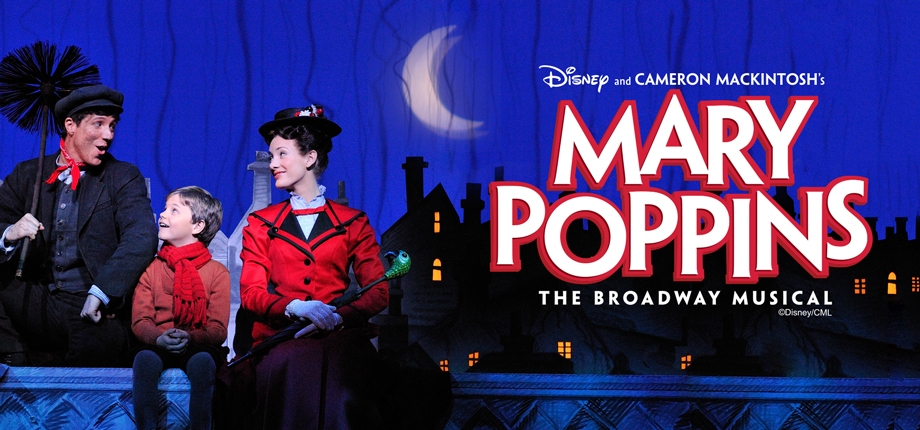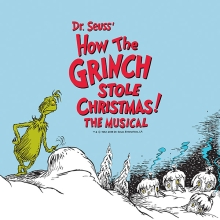Filichia Features: Mary Poppins This September

Filichia Features: Mary Poppins This September
How about presenting your upcoming production of Mary Poppins between Sept. 17 and 23rd?
Because, you ask, that’s the week that the Tony-nominated stage version of Mary Poppins debuted on Broadway?
No. It opened on Nov. 16, 2006, en route to 2,619 performances. That was enough for Mary to make the list of the Top 20 longest-running musicals in Broadway history.
Oh, you’re saying, then the third week of September is when it opened in London.
No. Mary Poppins debuted at the Prince Edward Theatre on Dec. 15, 2004.
Now you’re guessing, the original film debuted on Sept –
No, August 27, 1964, in fact. But the third week of September has officially been dubbed “National Nanny Recognition Week” to celebrate more than a million nannies currently working in the United States. And has there ever been a more famous nanny than Mary Poppins?
She first became celebrated through P. L. Travers’ 1934 young adult novel, which resulted in two sequels by the time Walt Disney came to call. Anyone who saw the recent film Saving Mr. Banks knows that getting Travers to agree to a film version, let alone a musical movie, was even harder than opening a childproof bottle of aspirin.
But Disney emerged victorious with a film that was Oscar-nominated. At the time, everyone assumed that the felicitous score by the brother-team of Richard M. Sherman and Robert B. Sherman would win the Academy Award for Best Score. Such songs as “Chim Chim Cher-ee,” “A Spoonful of Sugar” and, of course, “Supercalifragilisticexpialidocious” were memorized by every child with a record player.
But of these, only “Chim Chim Cher-ee” was nominated for Best Song and the smart money was evenly divided between two others: “Dear Heart” was a lovely title song waltz and “My Kind of Town” was a Sinatra-swingin’ tune. The five songwriters responsible for these two had nabbed six of the previous 20 Oscars for Best Song. The Sherman Brothers had never been nominated.
Well, the smart money turned out to be stupid: “Chim Chim Cher-ee” won – but surely the Mary Poppins soundtrack couldn’t capture the 1965 Grammy for Best Original Score from a Motion Picture or Television Show, could it? Look at the competition: The Pink Panther, Henry Mancini’s masterpiece that nestled cozy close to Mary’s Number Seven ranking by coming in at Number Nine; Goldfinger, which had produced a title song that had made it all the way to Number One; and no less than The Beatles’ A Hard Day’s Night, which had reached Number One and stayed there for 14 solid weeks.
But once again, Mary Poppins won.
In an era where famous musical movies are turned into stage ones, Mary Poppins was a logical candidate. Two mega-producers – Disney and Cameron Mackintosh -- shared different rights to the property, so they joined forces to produce what became a smash hit.
There were some changes made. Let it be known that George Stiles and Anthony Drewe -- who’d already had an Olivier-winning musical with Honk! -- heard about the project and wanted to be involved. They wrote a song that introduced Mary by her giving her lofty opinion of herself – that she was "Practically Perfect." The powers-that-be were so impressed that they had the team write seven more. (Memo to writers: if such pros can write on spec, you can, too.)
Many assume that Mary Poppins is a non-stop sweet (if not saccharine) story, but it actually isn’t. Mary has many questions and demands before she takes the job, which teaches a valuable lesson: when you’re on a job interview, don’t just settle for being interviewed, but seize the opportunity to interview the interviewer. Make sure that your potential boss and the company are right for YOUR needs, too.
The type of love that Julie Andrews displayed in the film would never be compared to the type she gave a year later to seven von Trapp children. Mary dispenses tough-love, and if anyone doesn’t like it, tough. That includes Mr. Banks, the workaholic father; Mrs. Banks, the doing-the-best-she-can mother; their son Michael and their daughter Jane, both of whom will be under Mary’s care and charge.
Your Mr. Banks is the ostensible villain. It’s one thing to be a father who isn’t home much, but Mr. Banks is a father who really isn’t there when he IS home. Mary will have to work hard to make him be all that he can be. (Workaholic fathers in the audience can profit from seeing the show.)
There’s another villain. When Mary Poppins seemingly takes her leave for good (although we know she won’t because the show has a full act to go), enter Miss Andrew, The Nanny from All Nine Circles of Dante’s Hell. She proves that the devilish nanny you know is better than the gorgon you don’t. For her costume, dust off that Wicked Witch of the West outfit from your recent Wizard of Oz production and puff up the shoulders.
Notice that Miss Andrew says “Not much of a house, is it?” which is hardly good public relations, but it does suggest that your set of the Banks’ home needn’t be opulent. Considering that Mr. Banks is seen to be working SO hard, we could easily believe that he’s scrambling for every pound and pence; thus, his home is hardly even a McMansion.
What an irony that the character is named Miss Andrew. Despite missing a final “s,” the name does bring to mind that actress who made her cinematic reputation for being all sweetness and light. In Mary Poppins, this horrifying Miss Andrew gets a valse macabre, but she doesn’t get to stay. “Bullies have no place here!” Mary says upon her return. (It’s a line that can apply to every community theater and drama club.)
Mary Poppins does offer one of the most difficult production numbers in musical theater history:
“Supercalifragilisticexpialidocious.” When Mary first uses it, Michael, with his arms akimbo, roars “That’s not a word!” Perhaps the dictionary doesn’t offer it, but there have been very few people in the last 52 years who haven’t encountered it.
For the stage show, directors Richard Eyre and Matthew Bourne -- and Bourne’s co-choreographer Stephen Mear – certainly didn’t take the easy way out. They gave each cast member a hand gesture for every one of the 14 syllables in the super-difficult word as well as for all the lyrics that followed.
Try that approach. If you cast balks at the enormity of the task, cite the line that opens the song: “In every job that must be done, there is an element of fun.” And it will be – when it isn’t hard work.
Doing “Supercalifragilisticexpialidocious” in this manner will mean your cast will be rewarded with the best type of applause: the audience will wildly handclap its approval and then of course will lessen it – but on second thought, the audience will realize that it didn't give enough praise for the achievement. As a result, the crowd will frenetically applaud harder to the point where the second round of applause will be even louder than the first burst.
You might get the same high-low-and-higher applause after you do the encore, but chances are your audience will respond by joining in the song by clapping in unison while everyone’s singing and gesturing.
Here’s where live theater shows its mettle. After all, if “Supercalifragilisticexpialidocious” were being filmed or taped, its cast members would have the luxury of doing it a dozen or more times until they got it right. In live theater, you’ve got to do it right every night without the option of a second chance.
So do it! But get this biggest obstacle out of the way first. For the first two weeks’ of rehearsals for Hello, Dolly! director-choreographer Gower Champion did NOTHING but stage the title song. For his time and efforts, he was rewarded by raves that called “Hello, Dolly!” one of the greatest showstoppers in Broadway history.
Thus, take your time with this one, and remember that patience is quite a virtue. Undoubtedly a few of your cast members will be zigging when they should be zagging, but they’ll all conquer it in due time. Start each and every rehearsal with this number and finish each and every rehearsal with it, too. You’ll master it!
Last summer, iTheatrics sponsored a workshop of Mary Poppins JR. Marty Johnson directed 49 children in a pilot project designed to see what should be included in any JR. edition, what shouldn’t and what could be improved. He and the four dozen kids mirrored the original “Supercalifragilisticexpialidocious,” so if those kids could do it, so can your cast.
After Mary Poppins JR. concluded, most everyone agreed that it was – to quote that new song – practically perfect in every way. So keep an eye out for when Mary Poppins JR. becomes available.
For those who are up to doing the entire show, do consider that third week of September slot. Invite local nannies to attend your production at a discount. If they do take you up on your offer, be prepared to hear a resigned and frustrated sigh when Mr. Banks says he’s out to find “the best possible nanny at the lowest possible wage.” What he of course gets is much more than he’d bargained for – just as fans of the Mary Poppins film will find they get so much more from the stage version.
You may e-mail Peter at pfilichia@aol.com. Check out his weekly column each Monday at www.broadwayselect.com, Tuesday at www.masterworksbroadway.com and Friday at www.kritzerland.com. His book The Great Parade: Broadway’s Astonishing, Never-To-Be Forgotten 1963-1964 Season is now available at www.amazon.com.

























